The 48th Session of the UN Human Rights Council
13 September–1 October 2021
Item 3: Promotion and protection of all human rights, civil, political, economic, social and cultural rights, including the right to development & Item 5: Human rights bodies and mechanisms
Panel Discussion on the Rights of Indigenous Peoples
(28 and 29 September)
By: Karin Heisen / GICJ
Executive Summary
Indigenous peoples are suffering disproportionately from the COVID-19 pandemic. This is due to their marginalization rooted in centuries of colonialism and land dispossession. During the annual panel discussion on the rights of Indigenous peoples, the Human Rights Council deliberated the situation of Indigenous peoples facing the pandemic, with a special focus on the right to participation. Panellists identified the digital divide and the lack of consultation, self-governance and culturally-appropriate responses as key issues. Many states highlighted the ways they support Indigenous peoples while others acknowledged the need to do better. Civil society called for an intersectional approach to pandemic recovery that draws on Indigenous knowledge and recognizes ecological rights.
The Geneva International Centre for Justice joins the call for Indigenous self-determination. Pandemic recovery plans must be Indigenous-led and the UN and member states must provide any support Indigenous peoples deem necessary.
Background
In September 2011, the Human Rights Council established an annual half-day panel discussion on the rights of Indigenous peoples through resolution 18/8. The theme of the 2021 discussion, mandated by resolution 45/12, was the situation of human rights of Indigenous peoples facing the COVID-19 pandemic, with a special focus on the right to participation.
Representing around 6% of the global population, Indigenous peoples are disproportionately impacted by the pandemic. Already facing existential threats, they are at higher risk of dying from COVID-19, of being excluded from pandemic-related decision-making and of experiencing discrimination in confinement measures. This is elucidated in reports by the Expert Mechanism on the Rights of Indigenous Peoples (A/HRC/46/72), by the Special Rapporteur on the rights of Indigenous peoples to the General Assembly (A/75/185) and Human Rights Council (A/HRC/48/54) as well as in statements and guidance notes.
The right to enjoyment of the highest attainable standard of physical and mental health is enshrined for everyone in article 12 of the International Covenant on Economic, Social and Cultural Rights and specifically for Indigenous peoples in article 24 of the United Nations Declaration on the Rights of Indigenous Peoples (UNDRIP). The UNDRIP also grants Indigenous peoples the right to determine, develop and administer health programs through their own institutions (art. 23) and to maintain their traditional medicines and health practices (art. 24).
Indigenous peoples have the right to participate in decision-making matters that affect their rights as well as to maintain their own decision-making institutions (art. 18, 20 and 34 UNDRIP). States must consult with Indigenous peoples and obtain their free, prior and informed consent before implementing any measures affecting them (art. 19, 32). Beyond this, Indigenous peoples enjoy the right to self-determination, by virtue of which “they freely determine their political status and freely pursue their economic, social and cultural development” (art. 3). In exercising this right, they “have the right to autonomy or self-government in matters relating to their internal and local affairs” (art. 4). States, organs and specialized agencies of the UN system and other intergovernmental organisations must provide financial and technical assistance to fulfil all rights enshrined in the UNDRIP (art. 39, 41).
Panel Discussion
Panellists
On September 28th, 2021, the Assistant Secretary-General for Human Rights, Ilze Brands Kehris, opened the meeting featuring the following panellists:
- Megan Davis, Chair of the Expert Mechanism on the Rights of Indigenous Peoples
- José Francisco Cali Tzay, Special Rapporteur on the Rights of Indigenous Peoples
- Anne Nuorgam, Chair of the Permanent Forum on Indigenous Issues
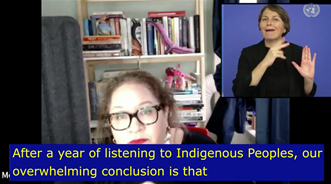
Megan Davis began by acknowledging the many Indigenous lives lost to COVID-19 and the accompanying loss of traditional knowledge. Indigenous communities have voiced how the pandemic has exacerbated existing structural inequalities, including unequal access to quality health care and potable water, lack of information and education and violence against women and children. Indigenous people have been targeted as transmitters of the virus and Indigenous human rights defenders have faced increased intimidation. Communities also illustrated important links between the pandemic and climate change.
Meanwhile, liberal democracies fail to meaningfully consult with Indigenous peoples during decision-making as well as ensure their self-determination, Davis asserted. Poor vaccination plans have worsened their marginalization and discrimination, causing low vaccination rates.
Davis emphasized that state recovery measures must have the free, prior and informed consent of Indigenous peoples and that Indigenous peoples must lead COVID-19 responses in their own communities. The more self-determination they have, the better they fare during the pandemic.
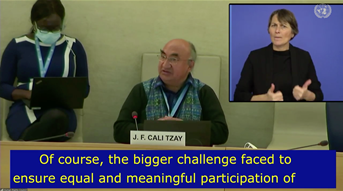
José Francisco Cali Tzay reaffirmed that states make little effort to consult with Indigenous peoples and to adapt timely and culturally appropriate recovery measures. Vaccination plans are released without addressing their linguistic needs, isolation and lack of healthcare infrastructure, generating their low vaccination rates.
Cali Tzay also expressed deep concern about the rise in illegal deforestation, incursion, land takings and violence during the pandemic. Emergency orders, bolstered by the lack of recognition and protection of Indigenous lands, are being used to extract and exploit resources. Cali Tzay called for a moratorium on all extractive projects on Indigenous lands during the recovery phase of the pandemic.
In light of government shortcomings, Indigenous peoples have coordinated their own positive community-level responses, Cali Tzay pointed out. The Kuikoro people in Brazil formed partnerships with hospitals and set up their own health centres, the Karen people in Thailand performed a village-closing ritual and the Mro people in Bangladesh set up bamboo fencing to isolate their community. The role of states, Cali Tzay declared, should be to “respect the autonomy of Indigenous peoples to manage the situation locally while providing them with the information and the financial support they identify as necessary.”
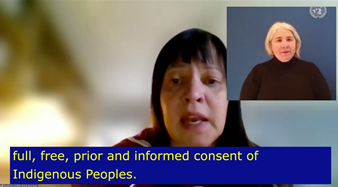
Following, Anne Nuorgam identified the digital divide, autonomy, self-governance, consultation and participation as key issues for Indigenous inclusion in the global plan to “build back better.” Lack of online connectivity has barred Indigenous youth from education and reduced Indigenous participation in decision-making spaces. Although their right to participation is clearly acknowledged in the UNDRIP, countries do not have adequate mechanisms to ensure Indigenous participation, especially in virtual consultations. Nuorgam stressed that now more than ever, governments must recognize Indigenous representative institutions in order to protect their cultures, health and livelihoods.
States
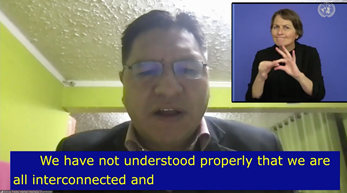
The floor then opened to state and civil society interventions. Notably, Bolivia voiced that “Mother Earth has been neglected. We have not understood properly that we are all interconnected and must work together to overcome this pandemic.”
Indigenous peoples, despite their vulnerability, are essential partners in the fight against COVID, Senegal added. The country drew attention to Indigenous institutions and laws that protect biodiversity and ensure successful recovery from emergencies.
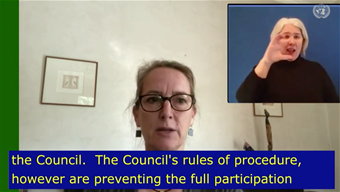
Australia, on behalf of Canada and New Zealand, brought up that the Council’s rules of procedures prevent Indigenous peoples from participating in their own right. Indigenous peoples must first register as NGOs and then receive ECOSOC accreditation. This is inappropriate as they are not NGOs and not all have formal representative bodies. The triad supports Indigenous peoples’ call to establish a unique category in the UN system.
Sweden, on behalf of the Nordic-Baltic states, called attention to how Indigenous women and girls, LGBTIQ and persons with disabilities face multiple, intersecting forms of discrimination.
Ukraine mentioned the deaths of and violations against Indigenous Tartar people at the hands of Russia in occupied Crimea. China noted that the death rate of Indigenous Americans during COVID is 2.4 times as high as white Americans. States including Indonesia and Guatemala called for universal, equitable access to vaccines.
Civil Society
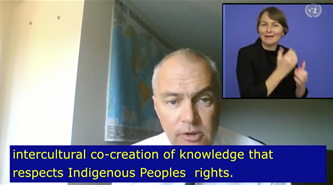
In the ensuing dialogue, civil society organisations gave insight to pertinent issues and solutions. The UN Food and Agricultural Organisation stated that COVID-19 recovery measures must ground in intercultural co-creation of knowledge. It pointed out how Indigenous peoples preserve 80% of the world's biodiversity thanks to their sustainable food systems. The UN Population Fund (UNFPA) highlighted women’s organisations mobilizing to fight COVID by drawing on their own traditional knowledge and governance systems.
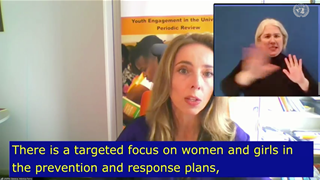
Another organisation vied for an intersectional approach that considers the diverse issues that Indigenous people face. LGBTIQ Indigenous people face stigma, structural marginalisation and discrimination in vaccine distribution. The UNFPA also mentioned the particular impact COVID has on Indigenous women and girls since they are more likely to work in the informal sector, be primary caregivers and have less access to health services. One NGO pointed out how the USA’s discriminatory legal system fails to protect Alaskan Native women and children from violence. Alaskan Native women report assaults twelve times more frequently than the rest of the country; they go missing and are murdered, a scourge worsened by the pandemic.
Finally, one NGO expressed the need to look at the root problem: our unbalanced relationship with the Earth. Our destructive behaviour towards nature endangers our own health. Leading up to the outbreak, Wuhan experienced record deforestation and petrochemical sales, compromising the immune systems of both people and planet, the NGO expressed. The hyper-acceleration of forest destruction needs to stop. The speaker asserted, “the situation is past human rights. The planet needs Earth rights and that’s the priority.”
Concluding Remarks
In their closing remarks, panellists urged states to ensure Indigenous self-determination. Davis expressed that it is crucial to distinguish between the right to free, prior and informed consent and the right to self-determination under article 3 UNDRIP. Consent should not be conflated with the right of Indigenous peoples to freely determine their futures in their entirety. The exercising of this right should also not be criminalized, as has been the case in some states, Cali Tzay added. Cali Tzay further asserted that the UN must ensure NGO participation. NGOs have valuable knowledge and direct contact to Indigenous peoples, but the UN has been restricting their participation for many years now.
The panellists called for Indigenous-led solutions to rebuilding from the pandemic and economic support for these. Although Indigenous peoples have voiced that they prefer in-person consultations, online options are often only possible. Nuorgam called on the UN to support digital connectivity by purchasing data packages and ensuring access to hardware and electricity. States should also support Indigenous peoples’ mobility needs, with their full, free and prior consent. Nuorgam continued that states need to collect disaggregated data on Indigenous peoples to support evidence-based policy-making and programming. Lastly, in these hard times, states should invest in mental health interventions, with the awareness that traditional medicines and practices can play a key role in the health of Indigenous communities.
Resolution 48.L.22
During this 48th HRC session, Mexico and Guatemala submitted draft resolution A/HRC/48/L.22 entitled Human Rights and Indigenous Peoples. The resolution decided that the next panel at the 51st session would be on the impact of social and economic recovery plans in the COVID-19 context on Indigenous peoples, with a special focus on food security. Member states adopted the resolution without a vote on October 8th, 2021.
Position of Geneva International Centre for Justice
Geneva International Centre for Justice believes in centring Indigenous voices. This means Indigenous peoples lead in pandemic recovery solutions to protect their own communities.
This COVID-19 period is part of a long history of states colonizing and dispossessing Indigenous lands. States have violated their human rights and attacked Indigenous bodies, thought, governance, self-determination and freedom. Now, Indigenous peoples are suffering disproportionately during the pandemic. The UN and member states must let Indigenous peoples control COVID-19 responses in their own communities and provide any assistance –financial, informational, technical or otherwise– Indigenous peoples deem as necessary.
We demand Indigenous self-determination.
Justice, Human rights, Geneva, geneva4justice, GICJ, Geneva International Centre For Justice
Previous Reports from the 48th Session of the UN Human Rights Council
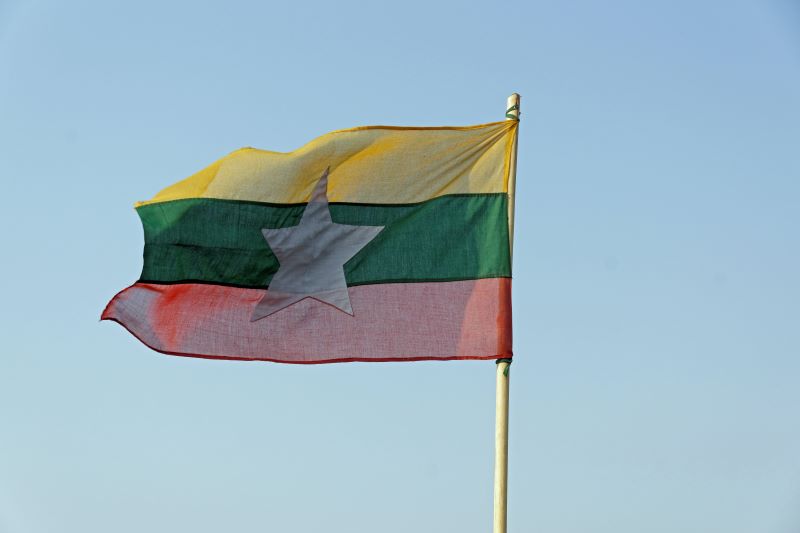 |
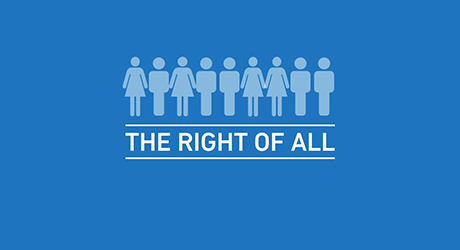 |
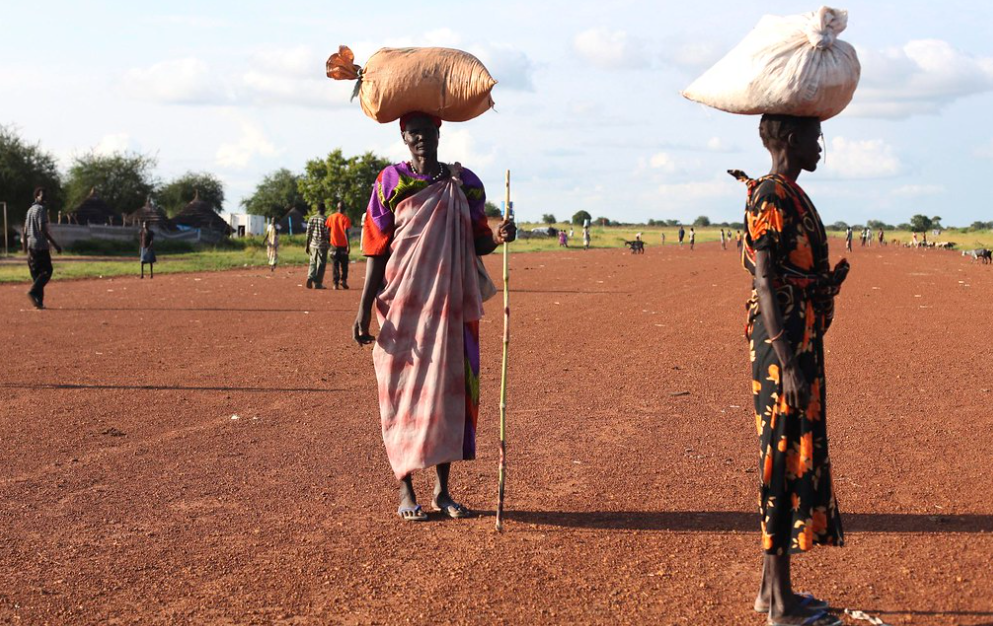 |
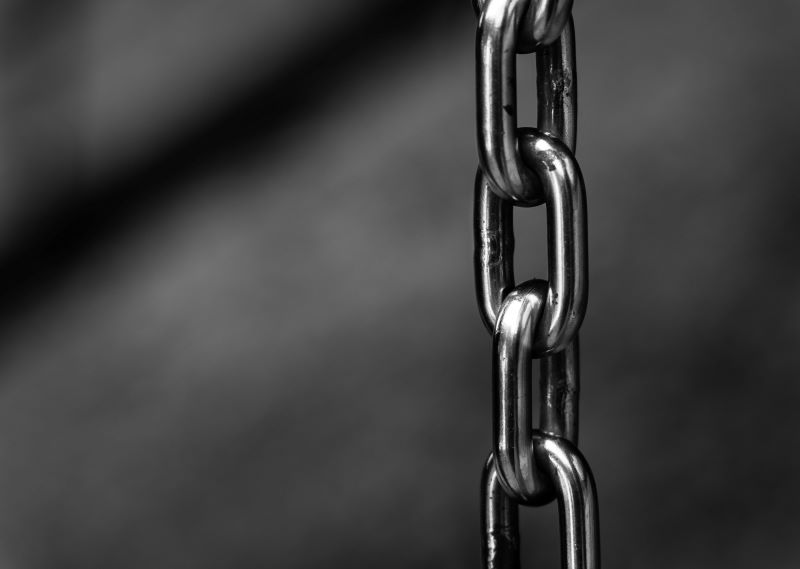 |
Human Rights Consequence of the Military Coup in Myanmar |
The Right to Development |
Human Rights Situation in South Sudan |
Report on slavery: causes and consequences |




